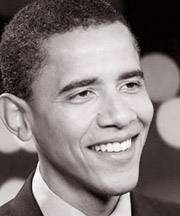Indian Ocean issues
 US
President Barack Obama visited the port city of Darwin in Australia’s
Northern Territory last Thursday. The town was practically closed down
as part of the measures for the visiting potentate’s security - which
included a $ 50,000 insurance policy in case of a crocodile attack. US
President Barack Obama visited the port city of Darwin in Australia’s
Northern Territory last Thursday. The town was practically closed down
as part of the measures for the visiting potentate’s security - which
included a $ 50,000 insurance policy in case of a crocodile attack.
The reason for the visit was the declaration by Obama on Wednesday
that Darwin would be a station for up to 2,500 US military personnel as
well as ships and aircraft. It is part of a US military build-up, which
includes the nearby Tindal airbase and the Stirling naval base near
Perth.
The move has upset China, against whom the action is broadly assumed
to be aimed. Obama’s remarks at Wednesday’s Canberra news conference
included hints that he felt China did not ‘play by the rules of the
road’.
|

US President Barack Obama |
According to the authoritative People’s Daily, Beijing was concerned
about the US expansion and analysts were warning of an attempt to box
China in with military bases. Foreign Ministry spokesman Liu Weiminon
questioned whether strengthening military alliances was the best idea in
a period of global economic unrest.
Peace zone
It has also caused ripples in the Association of South East Asian
Nations (ASEAN). Indonesian Foreign Minister Marty Natelegawa warned
that ‘a vicious cycle of tensions’ could result.
TB Hasanuddin of the Indonesian Parliamentary Commission on Defence,
Foreign Affairs and Information thought the US needed to explain the
deployment to ASEAN countries. He said ‘The placement of 2,500 US
mariners in Darwin would create new tension in ASEAN which has been
known as peace zone, not a conflict zone’.
Australian peace activists are apprehensive lest it make Australia a
potential target if case of exacerbated tensions in the region. They
also worry that it would enable the US to stockpile internationally
prohibited cluster bombs in their country. The US has been moving
recently to have the ban on the weapons removed.
There is also apprehension that the move may be a precursor to an
attack on Iran, ostensibly because of its alleged nuclear weapons
programme. The American inability to reduce its dependence on petroleum
has given it an ever-growing hunger for mineral oil resources.
Global trade
Critics have noted that Obama was playing to the Anglo-Australian
gallery, his speeches laden with terms in the Aussie vernacular and
appealing to the symbolism of a ‘shared heritage’ and ‘shared sacrifice’
while deliberately excluding China as well as ‘New Australians’.
For his part, Obama attempted to justify his action by asserting it
was important for the protection of commercial marine traffic. ‘This
region,’ said Obama in the course of his address in Darwin, ‘has some of
the busiest sea lanes in the world, which are critical to all our
economies.’
|

Australian Prime Minister Julia Gillard |
Obama’s remarks throughout his visit stressed America’s status as an
‘Asia-Pacific’ power. However, none of the three bases are on the
Pacific littoral of Australia, but on the Indian Ocean. Significantly,
Darwin was chosen over Queensland’s Townsville, which is definitely on
the Pacific shore.
The new deployment has underlined the growing importance of the
Indian Ocean. As Australia’s Foreign Minister Kevin Rudd said, ‘40
percent of global trade passes through the Indian Ocean, including 70
percent of the total traffic of petroleum products’.
Rudd was acknowledging the rising significance of the Indian Ocean
area coincidental with his participation in the meeting of the Council
of Ministers of the Indian Ocean Rim Association of Regional Countries (IOR-ARC)
held in Bangalore on Tuesday.
Climate change
Rudd conceded that the Indian Ocean Rim accounted for only 10 percent
of the world’s GDP, but stressed that this was rising. His country, too
has appreciated the IOR’s potential practically by building a new port
at Darwin to supplement its only major Indian Ocean general cargo port
at Fremantle.
The growing Australian emphasis on the Indian Ocean was revealed when
Prime Minister Julia Gillard announced that she would seek the support
of her Labour Party to end the ban on exports of uranium to India, which
has not signed the nuclear Non-Proliferation Treaty (NPT).
Nick Bryant, writing in the Lowy Institute for International Policy’s
‘The Interpreter’, said that:
‘The overturning of the uranium ban would also pave the way for a new
triangular frame in which Australia relies for its security on America,
its prosperity on China and looks to India for a combination of the
two.’
|

Australian Foreign Minister Kevin Rudd |
The aggravated tensions in the Indian Ocean are the worst since Sri
Lanka proposed it become a ‘zone of peace’ in the mid-1970s. There is
added urgency to the need, advocated by Rudd, for the IOR-ARC to be
transformed into a regional body consistent with the Ocean’s importance.
Rudd suggested that specific issues that needed to be worked on
immediately were ‘sustainable fisheries management; science cooperation
on climate change, food security and ocean science; disaster management;
maritime safety and security; trade facilitation; and resources and
energy security.’
Sino-Indian border
The suggestion of the Pakistan Navy’s Rear Admiral Khan Hasham bin
Saddique’ during the ‘Galle Dialogue 2011’, which concluded on Tuesday,
that there be increased security cooperation in the Indian Ocean, should
perhaps be tagged on to Rudd’s list.
Sri Lanka is positioned in an enviable position, both geographically
and politically. Not only is the island right in the centre of the
Indian Ocean, it is also equidistant in terms of friendship with all the
major players in the region.
Historically, this enabled the country to maintain good relations
with both sides of many enmities, for example China and India. Following
the Sino-Indian border war of 1962, Colombo was the venue of the
multi-party mediation efforts, which proved (alas) abortive - although
the initiatives which resulted were accepted by both sides.
Sri Lanka should therefore step into the breach once more and attempt
to establish the framework for mending fences in the Indian Ocean. It is
right and proper that the island should provide the location of an
Indian Ocean Secretariat to oversee all aspects of cooperation in the
region. |



